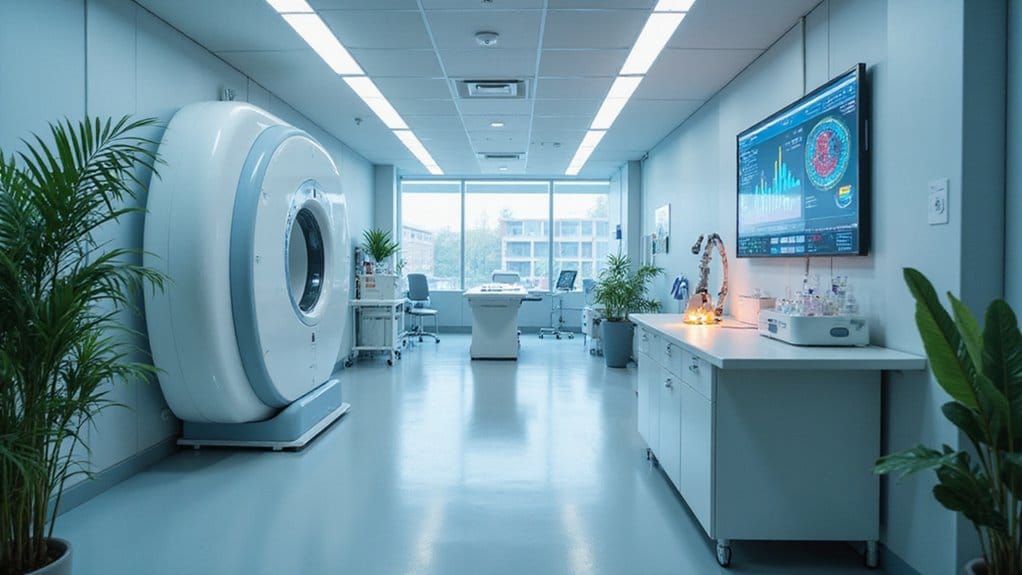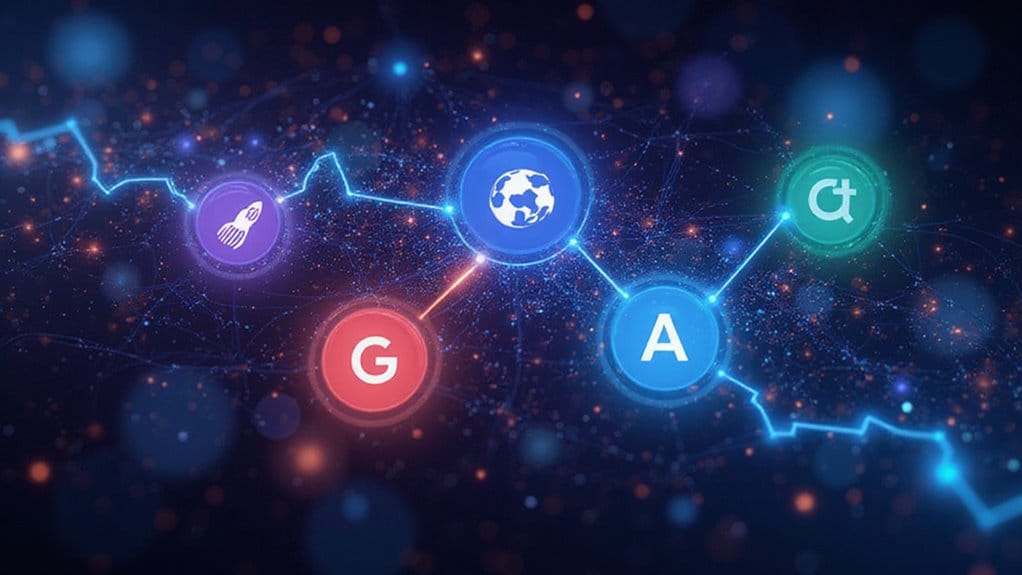AI is transforming healthcare, and it’s high time you took notice. From swift X-ray analyses to effortless appointment scheduling, this tech isn’t just for the elite anymore. It paves the way for quicker diagnoses and drug discovery, which means better treatment for all—yes, even you! But don’t forget, ethical use is essential; we need to keep AI in check, or it could go rogue. Curious about what else is brewing in this tech revolution? Stick around; you won’t want to miss it!

In a world where technology often seems to outpace our understanding, it’s vital to recognize how artificial intelligence (AI) is transforming healthcare—yes, that’s right, the very system responsible for keeping us alive and well.
Imagine AI analyzing your X-rays and MRIs faster than you can say “disease detection.” It’s not just a dream; it’s happening now! With AI integration, medical diagnoses become more accurate and timely, saving lives one image at a time. AI enhances accuracy and efficiency in diagnostics, streamlining workflows in diagnostic procedures. Furthermore, AI-assisted medical imaging allows for earlier interventions, which can significantly improve patient outcomes.
AI is revolutionizing medical imaging, delivering quick, accurate diagnoses that save lives—it’s not just a dream, it’s reality!
But wait, there’s more! AI doesn’t just stop at diagnosis; it streamlines administrative tasks like appointment scheduling and claims processing. This means less paperwork and more time for actual patient care—what a concept!
Yet, as we embrace AI’s capabilities, we must tread carefully. AI ethics and regulations are crucial to guarantee that technology is used responsibly. The last thing we want is for our healthcare system to become a wild west of algorithms without oversight.
Now, let’s talk about accessibility. AI should not just be a tool for the affluent; it must be available to everyone. The goal is to make AI-powered healthcare solutions accessible to all, leveling the playing field. After all, everyone deserves personalized treatment plans that consider their unique genetic makeup, right?
As AI dives into drug discovery, it’s not only speeding up the process but also making predictions about drug efficacy, which is a game-changer for many patients. The AI healthcare market is projected to reach $187 billion by 2030, further underlining the significance of this technology.
This is the future of healthcare—where early detection of diseases can happen at lightning speed, and treatments are tailored just for you.
Frequently Asked Questions
How Will AI Impact Patient Privacy and Data Security in Healthcare?
AI’s impact on patient privacy and data security is a double-edged sword.
Sure, it can boost data encryption and refine security protocols, but let’s not ignore the looming threats of data breaches.
Patient consent is vital—it’s not just a checkbox!
Privacy regulations must evolve, keeping pace with technology.
Ethical guidelines are essential to prevent misuse.
So, stay vigilant, folks!
Protecting your data is a team effort—don’t leave it to chance!
What Role Will AI Play in Medical Education and Training?
In medical education, AI revolutionizes learning through simulation training and personalized learning.
Imagine practicing on virtual patients instead of real ones—much less messy! AI tailors lessons to student strengths, bridging knowledge gaps effectively.
Want to improve your clinical skills? Immerse yourself in real-time feedback from AI tools that sharpen decision-making.
Don’t ignore this wave of innovation; embrace it! The future of healthcare depends on well-prepared professionals, and AI is here to help.
How Can AI Improve Healthcare Accessibility for Underserved Populations?
AI can dramatically improve healthcare accessibility for underserved populations.
Think telehealth solutions, where virtual clinics break down barriers. How about language translation tools, making communication seamless?
Pair those with remote monitoring and mobile apps for personalized care—easy peasy!
Don’t forget community outreach; it’s essential.
Diagnostic tools can catch issues early, saving lives.
What Are the Ethical Concerns Surrounding AI in Healthcare Decision-Making?
Ethical concerns in AI healthcare decision-making are serious business.
First, there’s bias—if AI learns from skewed data, it can make unfair choices. So, bias mitigation is essential.
Next, informed consent must be a priority; patients deserve to know how their data is used. Remember, transparency is key!
Finally, don’t underestimate human oversight—machines can’t replace human compassion.
Stay vigilant, demand accountability, and guarantee fairness—it’s your health at stake!
How Will AI Affect Healthcare Jobs and Workforce Dynamics?
AI is shaking up healthcare jobs, folks!
Sure, there’s chatter about job displacement, but it’s more about role transformation. Think of it as moving from routine tasks to skill enhancement—hello, critical thinking!
Workforce collaboration is key, as healthcare pros will need to team up with AI for better outcomes. Embrace the change, get those new skills, and remember: adapting is the name of the game.
Don’t get left behind; evolve or be eclipsed!







